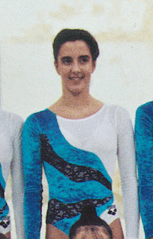Marta Aberturas facts for kids
Quick facts for kids Marta Aberturas |
||||||||||||||||||||||||||||||||||||||||||||||||||||||||||||||||
|---|---|---|---|---|---|---|---|---|---|---|---|---|---|---|---|---|---|---|---|---|---|---|---|---|---|---|---|---|---|---|---|---|---|---|---|---|---|---|---|---|---|---|---|---|---|---|---|---|---|---|---|---|---|---|---|---|---|---|---|---|---|---|---|---|

Script error: The function "getImageLegend" does not exist.
|
||||||||||||||||||||||||||||||||||||||||||||||||||||||||||||||||
| Personal information | ||||||||||||||||||||||||||||||||||||||||||||||||||||||||||||||||
| Full name | Marta Aberturas Rubio | |||||||||||||||||||||||||||||||||||||||||||||||||||||||||||||||
| Country represented | ||||||||||||||||||||||||||||||||||||||||||||||||||||||||||||||||
| Born | 5 July 1974 Gijón, Spain |
|||||||||||||||||||||||||||||||||||||||||||||||||||||||||||||||
| Discipline | Rhythmic gymnastics | |||||||||||||||||||||||||||||||||||||||||||||||||||||||||||||||
| Years on national team | 1988-1991 | |||||||||||||||||||||||||||||||||||||||||||||||||||||||||||||||
| Club | Club Escuela de Gimnasia Rítmica de Zaragoza | |||||||||||||||||||||||||||||||||||||||||||||||||||||||||||||||
| Head coach(es) | Ana Roncero, Emilia Boneva | |||||||||||||||||||||||||||||||||||||||||||||||||||||||||||||||
| Choreographer | Georgi Neykov | |||||||||||||||||||||||||||||||||||||||||||||||||||||||||||||||
| Retired | yes | |||||||||||||||||||||||||||||||||||||||||||||||||||||||||||||||
|
Medal record
|
||||||||||||||||||||||||||||||||||||||||||||||||||||||||||||||||
Marta Aberturas Rubio (born July 5, 1974) is a former rhythmic gymnast from Spain. She was a World champion in 1991. She won many other medals with the Spanish national rhythmic gymnastics team. The group of gymnasts she was part of is known as the "First Golden Girls."
Contents
Early Life and Training
Marta Aberturas was born in Gijón, Spain, in 1974. When she was seven years old, in 1981, her family moved to Zaragoza. There, she started learning rhythmic gymnastics at the Club Escuela de Gimnasia Rítmica de Zaragoza.
In August 1988, Marta was invited to join the national rhythmic gymnastics team of Spain. This was a big step in her career. She was part of the national team until 1991. During her time on the team, she trained for about eight hours every day. She trained at the Moscardó Gymnasium in Madrid. Her coaches were Emilia Boneva and Ana Roncero. Marta and her teammates also lived together in a house in La Moraleja.
Gymnastics Career Highlights
Marta was often a substitute gymnast for the team. This meant she was ready to step in if needed. She also performed in exhibitions and competed in international tournaments.
Early Successes
In early 1989, Marta won three silver medals at the DTB-Pokal Karlsruhe tournament. Soon after, as a substitute, she helped her team win three bronze medals at the World Championships in Sarajevo. The team won medals in the overall competition and in two specific routines: 12 clubs, and 3 ropes and 3 ribbons.
In December 1989, she won another bronze medal. This was in the overall competition at the Wacoal Cup in Japan.
European and World Medals
In April 1990, Marta performed in an exhibition in Zaragoza. Later that year, she competed as a substitute at the European Championships in Gothenburg. There, she won a bronze medal in the overall competition. She also earned a silver medal in the 12 clubs routine and another bronze in the 3 ropes and 3 ribbons routine.
At the World Cup final in Brussels, Marta and her team won three bronze medals. They earned one for each final routine. In November, they won a silver medal in the overall competition at the Wacoal Cup in Tokyo.
World Champion in 1991
In 1991, the team had two main routines. One was with 6 ribbons, and the other was with 3 balls and 3 ropes. Their ribbon routine used music called "Tango Jalousie." Before the World Championships, they won gold at a tournament in Karlsruhe. They also won three bronze medals at the Gymnastic Masters in Stuttgart.
On October 12, 1991, the Spanish group made history. They won the gold medal in the overall competition at the World Championship in Athens. This was the first time Spain had ever won a World Championship in rhythmic gymnastics. They beat the team from the Soviet Union by a very small margin. The next day, they also won silver medals in both the 6 ribbon and the 3 balls and 3 ropes finals. Marta was a substitute gymnast for both of these historic performances.
Retirement and Recognition
Marta Aberturas retired from rhythmic gymnastics in 1991, right after the World Championships in Athens. In 1992, she received the Medal of Sports Merit. This award was given by the Diputación General de Aragón. Her former teammate, Gemma Royo, also received this honor.
Legacy
The Spanish rhythmic gymnastics group of 1991 achieved something truly special. They won the first world title for Spain in rhythmic gymnastics. This was also the first time a team from a Western country had won against the strong teams from Eastern European countries. Their achievement is remembered in books about rhythmic gymnastics.
See also
 In Spanish: Marta Aberturas para niños
In Spanish: Marta Aberturas para niños

